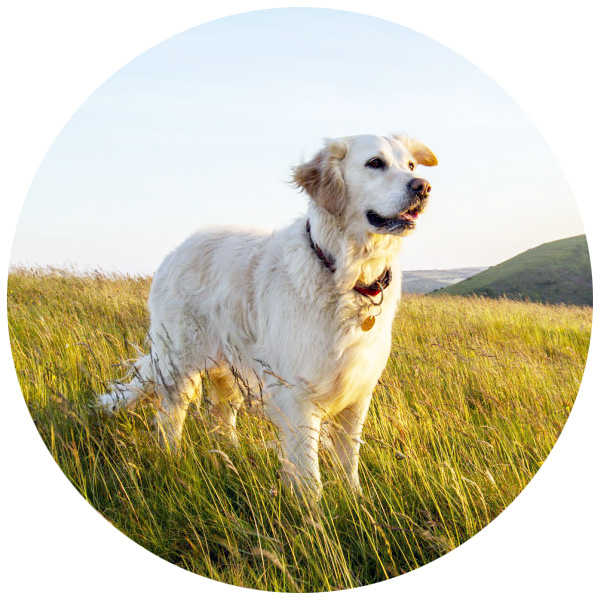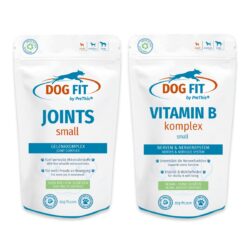Spondylosis in dogs
What is spondylosis?
Spondylosis (medically: spondylosis deformans) is a degenerative change in the spine in which bony growths – so-called spondylophytes – can form on the vertebral bodies. As the disease progresses, ossification can occur between individual vertebrae, increasingly limiting their mobility. Spondylosis usually occurs in older age, but can also be caused by genetic factors, excessive strain, obesity, or lack of exercise.
Possible Causes and Risk Factors
The development of spondylosis in dogs is often multifactorial. Typical triggers include:
- Age-related wear and tear of intervertebral discs and connective tissue
- Genetic predisposition, especially in large dog breeds
- Obesity or unfavorable strain on the spine
- Lack of exercise or repeated incorrect strain
- Inadequate supply of certain nutrients during growth
Symptoms and Course
Spondylosis often begins without symptoms; many dogs remain symptom-free for a long time. However, with progressive ossification and possible irritation of adjacent tissue, the following signs may occur:
- Stiffness and reluctance to move, especially after periods of rest
- Pain when standing up, jumping, or performing certain movements
- Tensity when palpating along the spine
- Coordination problems or unsteady gait
- Incontinence or other neurological abnormalities (if nerves are involved)
Diagnosis is usually made through clinical examination and imaging techniques such as X-rays. The earlier individualized care and adjustments to daily routine are provided, the better the dog’s quality of life can be maintained.
Therapeutic Approaches and Management
Spondylosis cannot be cured, but it can be well managed with an appropriate combination of specific measures. The goals of treatment are to relieve discomfort, maintain mobility, and increase well-being.
- Pain therapy: Veterinarian-prescribed painkillers or anti-inflammatory medications can provide relief during acute phases.
- Physiotherapy: Regular physiotherapy, massages, or treatments such as underwater treadmills help relieve tension and promote mobility.
- Gentle exercise: Smooth, gentle exercise (e.g., controlled walks, light swimming) prevents muscle loss and supports joint function. Abrupt movements, jumping, or strenuous stair climbing should be avoided.
- Heat applications: Heat can pleasantly relieve tense muscles.
- Weight control: A healthy body weight sustainably relieves strain on the spine.
Everyday tips for dogs with spondylosis
- Ensure non-slip surfaces to prevent falls.
- Avoid jumping, sudden braking, or strenuous stair climbing if possible.
- Adapt the exercise program to the individual’s resilience, ideally with physiotherapy support.
- Provide a well-padded, warm lying area.
- If unsure, consult a veterinarian or animal health practitioner early on.
Role of micronutrients
As part of a balanced diet, micronutrients can contribute to supporting the normal function of the spine, intervertebral discs, nerves, and connective tissue. In particular, a needs-based supply of B vitamins and selected nutrients such as glucosamine, MSM, and collagen can be beneficial. Targeted supplementation of the diet should always be individualized and in consultation with the veterinarian.
Potential contributions of targeted micronutrient supply:
- Support of the normal function of the spine and intervertebral discs
- Contribution to the physiological transmission of impulses in the nerve structures
- Nutritional support for special challenges to coordination or bladder function
- Supplementary supply of the surrounding tissue such as tendons and ligaments
Important note for dog owners
The care of a dog with spondylosis should always be individualized and under veterinary supervision. Careful observation, appropriate exercise, and a balanced diet form the basis for the dog’s well-being. Early adjustments inDaily routine and close coordination with the veterinarian can help maintain quality of life in the long term.

